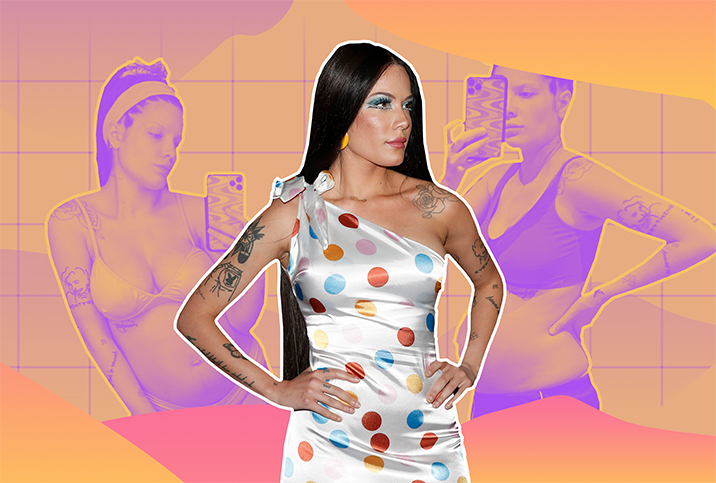Loving Your Mom Bod as Much as Your Partner Does

Fluffy bellies. Stretch marks (or "tiger stripes"). Thicker thighs. Fuller breasts. The "mom bod" has plenty of variations, and can be wildly different from our so-called "before bodies," when we were teens or younger people. Social media influencers, at least a few good ones, have worked hard to reshape the ideas around mom bods, rethinking the ever-constant bounce-back culture as unnecessarily stressful.
However, it's not always an easy journey. In the first nine months postpartum, some people begin to hate their bodies more than ever. One study published in Women's Health in 2009 revealed that participants' dissatisfaction scores increased from birth to the nine months postpartum period, even if they were losing weight. Another study published in Social Science and Medicine in 2017 indicated that people feel completely out of control over their "unruly" bodies during pregnancy and postpartum periods—so they might assume their partners find them less attractive, too. Partners do play a significant role in how we feel about our bodies, but in particular, our mom bods. If their partner is criticizing them, a study in BMC Pregnancy Childbirth in 2014 reported, mothers feel less secure in their bodies.
Not everyone thinks their partner's postpartum body is a negative change. Chelsea Skaggs, a traveling life and relationship coach for new parents during what she refers to as the "WTF Trimester," surveyed her Instagram followers about this very topic. The result? Mothers opened up about all the ways their partners adore their mom bods. Some said, "He still thinks I'm beautiful and loves that my body made our child," with others simply wrote, "big booty," or "big butt." One commenter said her partner loves her "C-section scar."
Aside from expanding hips and breasts, partners are proud. "Emotionally involved partners are appreciative of how much this body can do," Skaggs said.
Rethink those pre-baby jeans as an indicator of success
Fitting back into pre-pregnancy jeans is a goal that might not prove helpful, Skaggs suggested. People trying to lose baby weight might notice it takes longer than expected—everyone is unique. Moms might not see progress until they've concluded their breastfeeding journey as well, though it varies widely. Our "inner chatter" insisting we have to "bounce back" or hit whatever milestone we're seeking for body change can make it hard to think beyond our thoughts and narrative, Skaggs explained.
Instead of seeking to fit into a smaller size or trying to return to a prior body type, consider what both you and your partner love about your mom bod and go from there. Krista Haapala, a sexologist and conscious relationships guide in Portland, Maine, said looking to holistic wellness, including emotional well-being, is the first and most important step over changing your body. Instead, she hopes people will focus on "the basics," such as breathing deeply, sleeping well, drinking water, limiting caffeine and sugar, eating whole foods, moving your body and practicing stillness. "Birth is a massive embodied, emotional, and energetic life shift. It must be honored with reverence," she said. This realignment to focus on what your body accomplished, rather than which jeans it can fit into, can help.
Stop assuming your partner hates your mom bod
Even if a mother is struggling with their own perception of their body, that doesn't mean their partner sees them differently, and may even be enjoying their body more than they might think.
"Some partners enjoy the newness of a body that has a different shape from before or different sensitivities," Haapala said. "The birthing parent often sees this evolution as a liability, but having a partner with a curious mindset to 'learn you again' can be a lovely intimate journey."
Instead of assuming your partner is put off by your stretch marks and new shape, simply ask. Opening a dialogue with them about how you are feeling can not only make you feel better but can give them a chance to verbalize the pride they have for what you've been through.
"The supporting partners who do a lot of listening will have the most complete context for how the birth experience has changed the birthing partner's embodiment, mindset and relationship to their body image," Haapala said. "The more we invite our partners into our emotional and energetic context, the more they can respond sensitively to what we are experiencing."
Accept (and internalize) a compliment
It's one thing to hear your partner say you are beautiful or they can't believe how much your body has been through to produce life. It's another to grapple with your own self-esteem and body-image struggles, even if you have a supportive partner encouraging you. In addition to attempting to acknowledge and receive the compliment by simply saying "thank you," rather than denying it, new moms can try to analyze where their own insecurities are coming from.
"Especially in maternity leave, moms at home are in their brain so much…it's hard to think that if your partner says they love something, to feel something different from your own inner chatter," Skaggs said. "A lot of women struggle to accept that or hear that or internalize it."
She recommends monitoring your own thoughts to identify where they are coming from, and if it's a belief from an external source, like social media or your mother-in-law, versus one that aligns with your own values and expectations.
And what to do if they aren't so excited about it…
Not all partners are as excited about your mom bod as the ones above, which can be devastating if you are already trying to overcome your own self-esteem and body-image challenges.
First, Haapala said, "Recognizing your personal sovereignty is a game-changer. No one is beholden to change their body for anyone else, including their partners."
Regardless of your partner's opinions, she explained that focusing on the power that comes with creating life can help body-image pressures to feel more "inconsequential." Haapala said, "If there is ever a time in life for self-worship and embracing your strength, the postpartum phase is a ripe time to honor yourself."
Moreover, Skaggs said, what partners are often attracted to isn't a certain weight, size or stretch-mark-free skin, but rather confidence. Instead of working on that confidence in isolation, try communicating with them about your quest for it. "The more consistent and present communication between partners in good faith and loving regard, the sooner a new evolution of the relationship can be realized," Haapala said.
'If there is ever a time in life for self-worship and embracing your strength, the postpartum phase is a ripe time to honor yourself.'
Skaggs also said there can be a lack of education in partners coming off as insensitive or confused about postpartum and beyond body changes.
"It can be a great time for a partner to be involved, whether it's [scheduling] pelvic floor therapy, or just a follow-up appointment, or literally just doing some education on what all the body's pieces and parts that go into birth and postpartum and healing."
If you are struggling with body image, it can also help to meet with a perinatal therapist, a marriage counselor or a sex therapist who can work through this with you—as well as your partner—to improve communication and other aspects of the relationship. It's time to rethink why we even want our mom bods to change at all, especially if they are healthy and happy. The dad bod had its moment, now it's our turn.


















